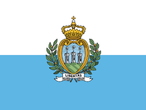
Call 0330 880 3600 Calls may be monitored or recorded. Opening Times.
- TRAVEL INSURANCE
- COVID-19 COVER
- More Options
- Help & Advice
- Existing Customers

Call 0330 880 3600 Calls may be monitored or recorded. Opening Times.

Need help?
UK Customer Services0330 880 3600*
Open Monday to Friday 9:00am to 6pm, Saturday 8:30am to 4pm and closed Sundays.
*Calls are recorded for training and quality purposes.

Official name: Republic of San Marino
Capital city: San Marino
Languages spoken: Italian
Population: Around 34,000
Currency: Euro (EUR)
Time zone: GMT+1 (GMT+2 in summer)
Driving side: Right
Climate: Temperate, with warm summers and cool winters
San Marino, perched on the slopes of Mount Titano in northern Italy, is the world’s oldest surviving republic and one of its smallest countries. Known for its medieval architecture, dramatic hilltop fortresses, and panoramic views, San Marino offers a unique step back in time. Despite its size, the republic is fiercely proud of its independence, traditions, and heritage.
San Marino is a landlocked enclave surrounded entirely by Italy. Covering just 61 square kilometres, it sits on rugged terrain dominated by Mount Titano. Its hilltop position provides sweeping views across the Apennine Mountains and the Adriatic Sea.
There are no airports within San Marino, so travellers usually arrive via nearby Rimini in Italy, which has both an international airport and train links. From Rimini, buses and taxis connect to San Marino. Key attractions include the Three Towers of San Marino, the historic city centre (a UNESCO World Heritage Site), and numerous museums showcasing its rich history.
San Marino has no border controls with Italy, so entry requirements are the same as Italy’s. UK nationals do not need a visa for short stays of up to 90 days within the Schengen area. For assistance, the nearest British Embassy is located in Rome, Italy.
San Marino uses the euro (EUR) as its official currency. Credit cards are widely accepted, and ATMs are available throughout the country. Shopping for stamps, coins, and local crafts is popular with visitors, and prices are comparable to those in Italy.
Healthcare facilities in San Marino are modern and reliable, though limited by the country’s small size. More advanced care is available in nearby Italy. UK travellers should ensure they have comprehensive travel insurance to cover medical treatment and emergencies. EU and UK visitors can also use reciprocal healthcare agreements for basic treatment, but insurance is still recommended.